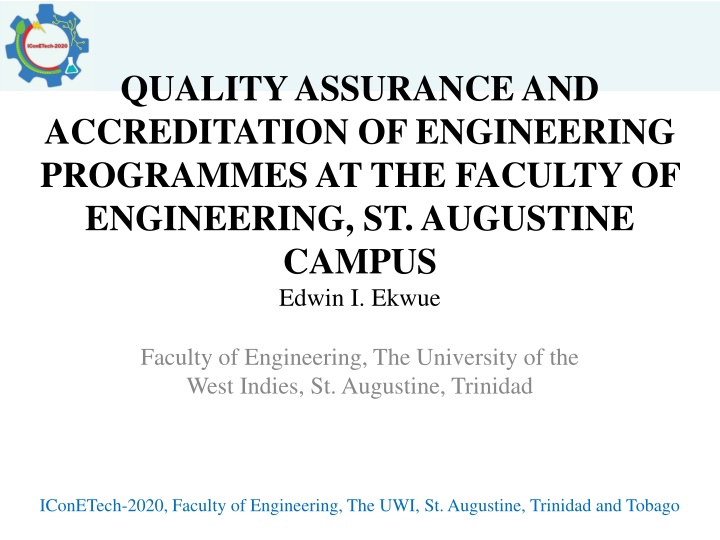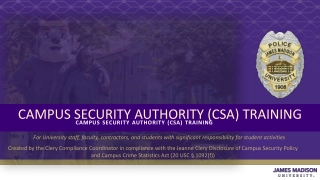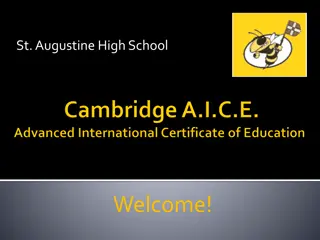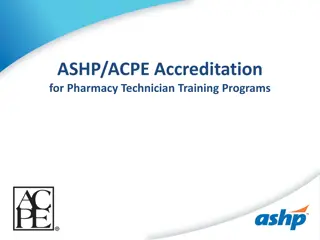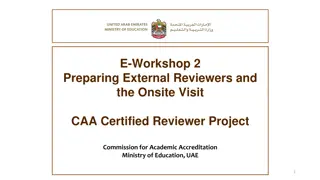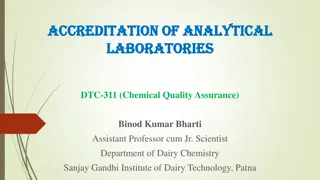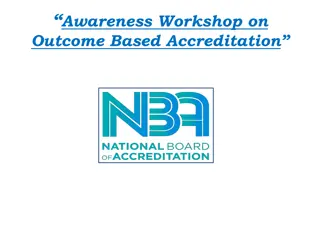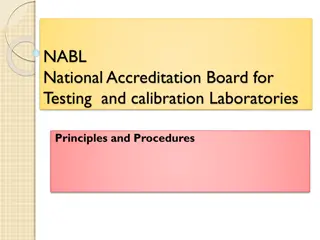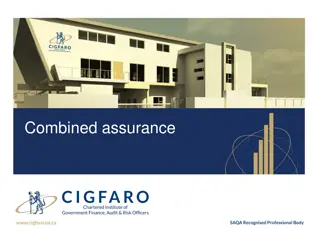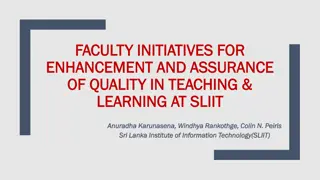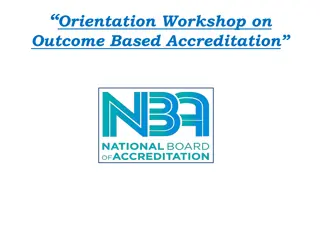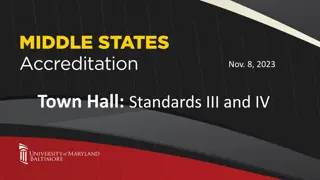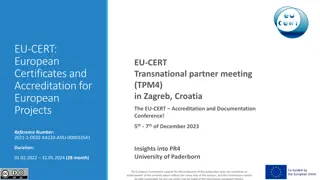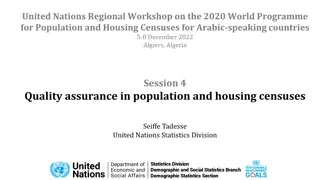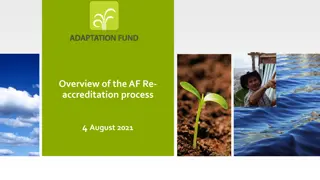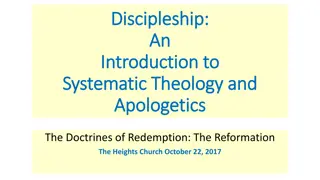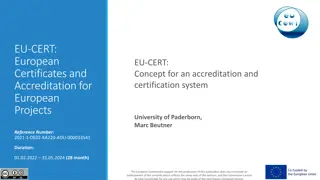Quality Assurance and Accreditation of Engineering Programmes at the Faculty of Engineering, St. Augustine Campus
Accreditation plays a vital role in evaluating educational programs at the Faculty of Engineering, UWI St. Augustine Campus, ensuring high standards. This paper explores the utilization of accreditation systems in the Caribbean region, focusing on the British and American models. The aim is to maintain quality in program delivery through established processes and steps. The history and growth of the Faculty of Engineering within the UWI system are also highlighted.
Download Presentation

Please find below an Image/Link to download the presentation.
The content on the website is provided AS IS for your information and personal use only. It may not be sold, licensed, or shared on other websites without obtaining consent from the author.If you encounter any issues during the download, it is possible that the publisher has removed the file from their server.
You are allowed to download the files provided on this website for personal or commercial use, subject to the condition that they are used lawfully. All files are the property of their respective owners.
The content on the website is provided AS IS for your information and personal use only. It may not be sold, licensed, or shared on other websites without obtaining consent from the author.
E N D
Presentation Transcript
QUALITY ASSURANCE AND ACCREDITATION OF ENGINEERING PROGRAMMES AT THE FACULTY OF ENGINEERING, ST. AUGUSTINE CAMPUS Edwin I. Ekwue Faculty of Engineering, The University of the West Indies, St. Augustine, Trinidad IConETech-2020, Faculty of Engineering, The UWI, St. Augustine, Trinidad and Tobago
INTRODUCTION Accreditation is the evaluation of an educational institution or programme by an independent body of professionals. Developing countries do not have the industrial maturity and reputation of industrialized countries. They therefore adopt or develop systems of accreditation that are internationally recognised. The Washington Accord of 1989 represents an agreement for mutual recognition of accredited professional engineering academic qualifications among English-speaking countries of the world including UK, USA and 13 other countries. IConETech-2020, Faculty of Engineering, The UWI, St. Augustine, Trinidad and Tobago
INTRODUCTION The accreditation systems in North America and United Kingdom are used by universities in Caribbean region including University of the West Indies. The two systems of accreditation are similar, except that the American System is more output based and the British system is more prescriptive In the Faculty of Engineering at UWI, St. Augustine Campus, the British System is utilised, mainly because of the historical links with the UK. UWI, Mona Campus uses the American System. Both Accreditation Bodies are Signatories to the Washington Accord. IConETech-2020, Faculty of Engineering, The UWI, St. Augustine, Trinidad and Tobago
Aim of this Paper The aim of this paper is to describe how accreditation system is utilised in the Faculty of Engineering at St. Augustine, Trinidad to ensure that the quality of the delivery of its programmes is at a high standard. The paper was derived from a survey carried out by the author. It describes the quality systems available in the Faculty of Engineering and fully describes the steps involved in the accreditation process. IConETech-2020, Faculty of Engineering, The UWI, St. Augustine, Trinidad and Tobago
The University of the West Indies The University of the West Indies (UWI) with an enrolment of close to 50,000 students serves 17 English-speaking states in the Caribbean. There are five major campuses at Jamaica, Trinidad, Barbados, Open Campus and Antigua. In 1961, the Faculty of Engineering was started in St. Augustine Campus in Trinidad with 28 students which has now grown to more than 1800 students pursuing Bachelor s, Master s and Doctoral degrees. During 1961/62 Academic year (the first year of teaching), the Faculty initially offered undergraduate and graduate research degrees in the main branches of Engineering The Faculty now comprises of five (5) academic departments. IConETech-2020, Faculty of Engineering, The UWI, St. Augustine, Trinidad and Tobago
QUALITY ASSURANCE SYSTEMS AT UWI Faculty of Engineering adopted the British approach of quality assurance including the assessment of all examination materials by external examiners. Other quality assurance measures adopted include among others student/staff, industrial liaison, curriculum committees, as well as the personal tutor-tutee system. Also setting up of quality assurance offices, quality units and quality manuals, holding regular Departmental and Faculty board meetings all aimed at improving the quality of delivery. In the 1980 s and 1990 s, with the increased need to ensure the provision of programmes of very high quality, the departments in the Faculty invited the British Institutions to accredit their programmes. IConETech-2020, Faculty of Engineering, The UWI, St. Augustine, Trinidad and Tobago
Accredited programmes at the Faculty of Engineering Figure Title IConETech-2020, Faculty of Engineering, The UWI, St. Augustine, Trinidad and Tobago
UK Accreditation System The Engineering Council has the overall responsibility for establishing and maintaining the standards both of the accreditation of engineering degree programmes, and of the registration of qualified professional engineers. The standards for registration are designed in terms of competences published in the UK Standards for Professional Engineering Competence (UK-SPEC). The usual route for achieving the required competences is obtaining an accredited engineering degree, followed a period of initial professional development or an Accredited MSc. and then industrial experience. The Engineering Council itself does not conduct accreditations, but licences the discipline-specific Professional Engineering Institutions (PEIs). IConETech-2020, Faculty of Engineering, The UWI, St. Augustine, Trinidad and Tobago
The UK-SPEC Output Standards The UK-SPEC output standards are of two types: General Learning Outcomes, which are applicable to all the programmes, and the Specific Learning Outcomes, which apply to the particular discipline. The broad areas of the output standards under the General Learning Outcomes include Knowledge and Understanding, Intellectual Abilities, Practical Skills and General Transferable Skills. The Specific Learning Outcomes include Underpinning Science and Mathematics, Engineering Analysis, Design, Economic, Social and Environmental Context and Engineering Practice. IConETech-2020, Faculty of Engineering, The UWI, St. Augustine, Trinidad and Tobago
Steps in the Accreditation Process The Professional Engineering Institution (PEI) receives the request and agrees on a target date for the accreditation or re- accreditation visit with the department and the date to receive the required documents. The documentation includes information on the details of teaching and learning assessment strategies, the human and material resources available, quality assurance arrangements, the admission of students for the programmes and how the cohort entry standard will be supported. The PEI appoints an accreditation team to examine the documentation and to make arrangements for a visit to the department. The panel normally includes academic and industrial members. IConETech-2020, Faculty of Engineering, The UWI, St. Augustine, Trinidad and Tobago
Steps in the Accreditation Process The visits are typically two to four days duration and the panel meets staff, students, visits library, laboratory and studio resources, and scrutinises student output including examination papers, projects and other assessed student work, and reports to ascertain if the required learning outcomes are being met. The team normally pays visits to the Faculty Dean, the Campus Principal and other officials from the St. Augustine Campus including the Registry. Each PEI reports back to its Approval body whether or not to accredit or re-accredit the programmes. Accreditation is normally up to five years, although it could be for three years, or shorter periods of accreditation. IConETech-2020, Faculty of Engineering, The UWI, St. Augustine, Trinidad and Tobago
Regional Accreditation Body Imbert and Lewis in 2004 and others, proposed the establishment of a Caribbean engineering accreditation body that would eventually be given the responsibility for accrediting all engineering degree programmes in the Caribbean region. In 2009, the Caribbean Accreditation Council for Engineering and Technology, CACET was officially established to accredit engineering programmes offered by the institutions in the Caribbean. Until CACET is fully established and internationally recognised through the membership in the Washington Accord or any other comparably recognized international body, there is still room for the international accreditation by the British Institutions at the Faculty of Engineering at UWI. IConETech-2020, Faculty of Engineering, The UWI, St. Augustine, Trinidad and Tobago
Concluding Remarks The aim of all the departments in the Faculty of Engineering at The University of the West Indies in St. Augustine is to ensure that all their programmes obtain full accreditation by recognised institutions, in this case, the British Institutions. International accreditation provides the programmes with a stamp of approval and enhances the international status of the Departments, Faculty and the University, as a whole. It also provides graduates confidence in their qualifications to be recognised globally. IConETech-2020, Faculty of Engineering, The UWI, St. Augustine, Trinidad and Tobago
Concluding Remarks Since considerable number of graduates migrate for work and further studies, the professional accreditation provides the much needed opportunity for UWI engineering graduates to seek professional employment worldwide, with minimum or no hassle. The British system of accreditation is thorough, is of a high standard, and is internationally recognised. Until the CACET, the newly formed regional engineering accreditation body is fully developed and functional, the use of the British institutions or other comparative international institutions to accredit programmes at the Faculty of Engineering at UWI, St. Augustine Campus is strongly advised. IConETech-2020, Faculty of Engineering, The UWI, St. Augustine, Trinidad and Tobago
References Chowdhury, H. ; F. Alam, S.K. Biswas, M.T. Islam, A.K.M. 2019. Sadrul Islam. Quality assurance and accreditation of engineering education in Bangladesh. Procedia Engineering 56, (2013) 864 869. G. Augusti, I. Freeston, G. Heltmann, R. Martin. 2007. Accreditation of engineering programmes as a tool to assure academic quality and relevance for the job market. Strategy and Practice, 2nd European Quality Assurance Forum, 1-16. Available at: https://www.enaee.eu/wp- content/uploads/2018/11/Rome-07-Augusti_el-EQAF-paper1.pdf C.A.C. Imbert, T.M. Lewis. 2004. Accreditation and mutual recognition of engineering qualifications in CARICOM. West Indian Journal of Engineering 26 (2), 55 64. Washington Accord. 2014. Celebrating International Engineering Education Standards and Recognition. Available at: https://www.ieagreements.org/assets/Uploads/Documents/History/25Years WashingtonAccord-A5booklet-FINAL.pdf. IConETech-2020, Faculty of Engineering, The UWI, St. Augustine, Trinidad and Tobago
References R.B. Vea. 2007. The importance of accreditation of engineering programmes to the global practice of the profession. Transactions of the National Academy of Sciences and Technology Philippines 29, 348 355. The University of the West Indies Website. 2020. Welcome to UWI. Available at: http://www.uwi.edu/about.asp Faculty of Engineering. 2019. Undergraduate Regulations and Syllabuses 2019/2020. Available at: https://sta.uwi.edu/resources/documents/facultybooklets/EngUndergrad.pdf Engineering Council (ECUT). 2005. UK Standard for Professional Engineering Competence: Chartered Engineer and Incorporated Engineer Standard. Caribbean Accreditation Council for Engineering and Technology. 2009. Available at: https://www.slideserve.com/axl/caribbean-accreditation- council-for-engineering-and-technology IConETech-2020, Faculty of Engineering, The UWI, St. Augustine, Trinidad and Tobago
THANK YOU! IConETech-2020, Faculty of Engineering, The UWI, St. Augustine, Trinidad and Tobago
